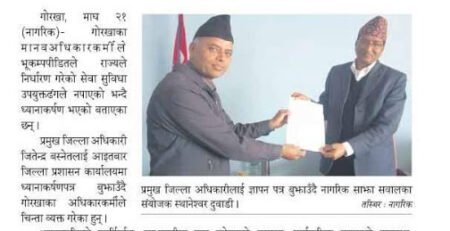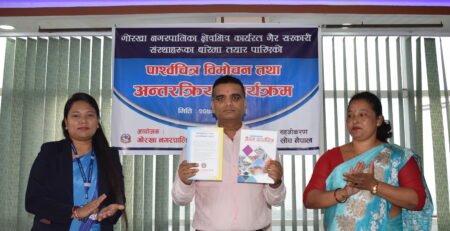Niraula interviewed by ‘The Hindu’
‘Mixing religion, politics sees rights violation worldwide
Global board member of International Humanist and Ethical Union says in a plural society, everyone should be able to express their ideas with dignity
Critical thinking, or the right to question authority or go against a majoritarian view, may not be in vogue in the country these days, but valuing the individual’s freedom to express himself or herself has roots in ancient India, says Uttam Niraula, a global board member of the International Humanist and Ethical Union, also known as Humanists International. Democracy, dignity and equality collectively qualify as humanism, and have been adopted more by the West, he says. Mr. Niraula was in the city in connection with a three-day international conference organised by the Maharashtra Andhashraddha Nirmulan Samiti, founded by the late rationalist Narendra Dabholkar. The conference marked 30 years of the rationalist and anti-superstition movement in the State, and witnessed participation from several organisations the world over working in humanism, human rights and promoting a scientific temper. Mr. Niraula spoke to The Hindu on whether a humanist is necessarily atheist, and the mixing of religion with politics. Excerpts.
Who is a humanist?
A humanist is someone who questions authority, is free thinking, open minded and does not violate human rights. Because human rights are universal and cannot be violated in the name of caste, religion, masculinity or politics. The Humanist International, though based in London, works in around 70 to 80 countries. There are some countries like Pakistan or Saudi Arabia where it is very difficult for us to work. We are working on human rights issues in general. There are countries in the world where people are not able to express their ideas, if those are different from the mainstream. A few examples can be seen in India as well. It is our belief that in a plural society, everyone should be able to express their ideas with dignity.
Does being a humanist mean promoting atheism?
Many of us are humanists and atheists, but we don’t promote atheism. It is a personal thing. But we make people think critically. Be open-minded. We make people question authority.
Many in India argue that humanism is a western concept. What do you say?
It is not. Go back in time. It is a unique idea that came from greater Bharat, as one would call it: being rational, a non-believer, humanist and even an atheist. We are promoting our heritage. Buddha encouraged everyone to ask questions, until you get the answer. What was the movement of Charvaka? It was against those making rules for others, promoting shudras to question authority. Jainism focused on human beings, rather than god. From that time to Dr. Babasaheb Ambedkar, the tradition is glorious. It is all about democracy, dignity and equality. These days, western countries are adopting it more than we are.
Should one abolish religion to be a humanist?
No. There are atheists and rationalists. There are people who say, let’s forget god for a moment and concentrate on human beings and their betterment. There are sceptics, who question god. It is not about giving up religion, but giving too much value to it, over humans. Countries where the law of god is placed above the law for human beings find it difficult to grow. Sadly, the blasphemy law exists in many places in the world, as a gift from the British to ease their colonisation.
Do you face challenges from the government in your work?
Politicians want more votes. For them, making people less involved in or aware of political or economic issues is a way to go forward. This is a worldwide phenomenon. In the U.S., the president is targeting immigrants to attract a large chunk of white voters. In India, politics is being played to appease the majority Hindu population. We believe that even if there is a single person who questions authority, he or she must be respected. Every human being counts. But politics does matter, and impacts people. We work with them as well, and try to make them see reason. The human race depends on the policies they make.
How serious is the mixing of religion with politics?
It is extremely serious. Let’s take India’s example and the politics over the cow; the crimes that arise from the hate directed at minorities. It leads to an extremely uncivilised discourse in the country. India’s Constitution is one of the best in the world. All democracies take it as a reference because of its idea of scientific tamper, secularism, protecting the country’s diversity. What is happening in the country is the exact opposite of what the Constitution says. Intermixing of religion and politics ensures that violation of human rights is accepted as a part of religion. Pakistan is another example. In the name of Sharia law, the individual can be lynched. It happens when religion mixes with the State.
You are from Nepal, a former Hindu country. How did this line of work attract you?
My father was a priest and when I was younger, I performed several karmakandas (rituals). In college, when I met people from other religions, I started questioning whether my viewpoint was universal. I later got an opportunity to travel to Pakistan where I found that they did not know the names of my gods and goddesses. I was shocked. A country so close to my own was detached from my beliefs. The process of questioning and reading began, and I started to consider myself universal and not limited to a small sect.
How do you collaborate with the United Nations?
We work with special staff in the UN to raise the voice of the marginalised, especially those who are persecuted for not belonging to a certain religion. There are many such people in jail, given capital punishment. We raise their concerns. We also highlight cultural practices and superstitions that violate human rights. We also follow up on investigations at the international level of murders of activists, like Dabholkar and Kalburgi (scholar and rationalist M.M Kalburgi, who was murdered in 2015). We also extend support to organisations working on the ground by raising their concerns at a global level.
Interviewed by;
https://www.thehindu.com/profile/author/Alok-Deshpande-256/







Leave a Reply